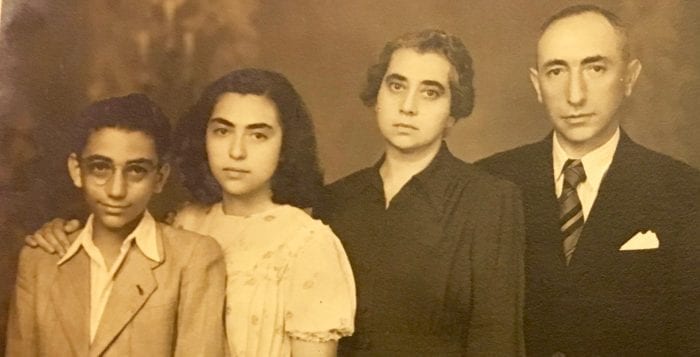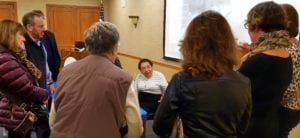Grazie Italia! A Holocaust survival story

By Donna Newman
Most Holocaust survival stories, told by those still around to bear witness, describe boxcars and concentration camps, starvation and abuse, and the horrific separation of children from their parents.
In a recent program at the Emma S. Clark Memorial Library in Setauket, titled Grazie Italia, local nonagenarian Beruria Stroke told her story of survival and it was quite different. She described a long and tortuous journey from Zagreb, Yugoslavia, to Campobasso, Italy, where advancing Allied forces liberated the Wiener family, who had been fleeing the Nazis — often day by day — for two and a half years.
Stroke’s life story had all the elements of a thriller and, in the discussion that ensued following her presentation, most of those in attendance encouraged her when she said she was thinking about writing a book. The general consensus: It is a story that should be shared.

Speaking without notes, Stroke began her narrative in an idyllic-sounding childhood in Zagreb, Yugoslavia. Her parents, Julius and Frances Wiener, were intellectuals — people of means — and very well read. She credits her father with the ability to foresee the events of the second World War after reading Hitler’s book, “Mein Kampf.”
In 1939 her parents traveled to Palestine, then under British control, and applied for papers for their family to immigrate. As they waited for the papers, they established a plan to leave Yugoslavia. It was a long wait. When transit visas finally came through on April 4, 1941 Beruria, her parents and her younger brother Željko, fled to the east via the famous Orient Express. They only made it as far as Belgrade.
In Belgrade, the train was stopped and all passengers had to find overnight lodgings. They expected to board the train the following morning to continue their journey. But that night, while staying at the apartment of an uncle, young Beruria experienced the horrors of war firsthand. She described hearing sirens at 3 a.m. but then was told it was “just an exercise.” At 6 a.m. there were no sirens — just bombs falling. The next day, after realizing they could no longer go forward, they learned of a train that could take them back to Zagreb. They negotiated the rubble that Belgrade had become, walking past dead bodies in the street. As fate would have it, they missed the train, but were directed to a spot where another train would be forming. They waited there, inside a boxcar. By the time the train left, the boxcar was filled beyond capacity. In Stroke’s mother’s words, “Not a needle could come between one person and another.”
Back in Zagreb, things had changed over night. Jews were made to wear identifying cloth badges bearing the letter Z topped by an accent mark that looked like a V — the letter representing the word for “Jew” in the Croatian language. Heads of families were being arrested and incarcerated. In exchange for their large apartment, Julius Wiener negotiated travel papers and safe transit to a train headed toward the Italian border. Stroke said, “We left in the nick of time. That night the Nazis came [and would have taken us] to a concentration camp.”
Throughout her story Stroke made note of unexpected but lucky moments that allowed her family to survive intact. It was serendipity, she said, that got them through the German occupation — serendipity, and the help of many good people along the way.
After the family made it to Italy, they still had the difficult task of avoiding capture. Stroke told of their journey south along the eastern coast of Italy on bicycles — another of her father’s brilliant ideas — sheltering overnight wherever they could find space, so as not to be outdoors after curfew.
The Wieners were among those liberated by Canadian forces on Oct. 14, 1943 in the city of Campobasso in southern Italy. That event launched the next phase of her young life, which led to her emigration to Palestine in 1945. But that’s another story.
This was only the second time Stroke has shared her story publicly. The first time was this past April at the invitation of Rabbi Joseph Topek of Hillel, a Jewish student organization on the Stony Brook University campus. Israeli premed student Eilona Feder worked with Stroke to facilitate her talk.
Feder is the Israeli-American Council “Mishelanu” (Hebrew for “from ourselves”) intern on campus, tasked with connecting Israeli students as well as offering educational and cultural programs open to all. Feder has been involved in Holocaust education for years, ever since her middle school days in Israel. “I became so involved,” she said, “because my grandfather is a Holocaust survivor, and he was never willing to tell me his story.”






